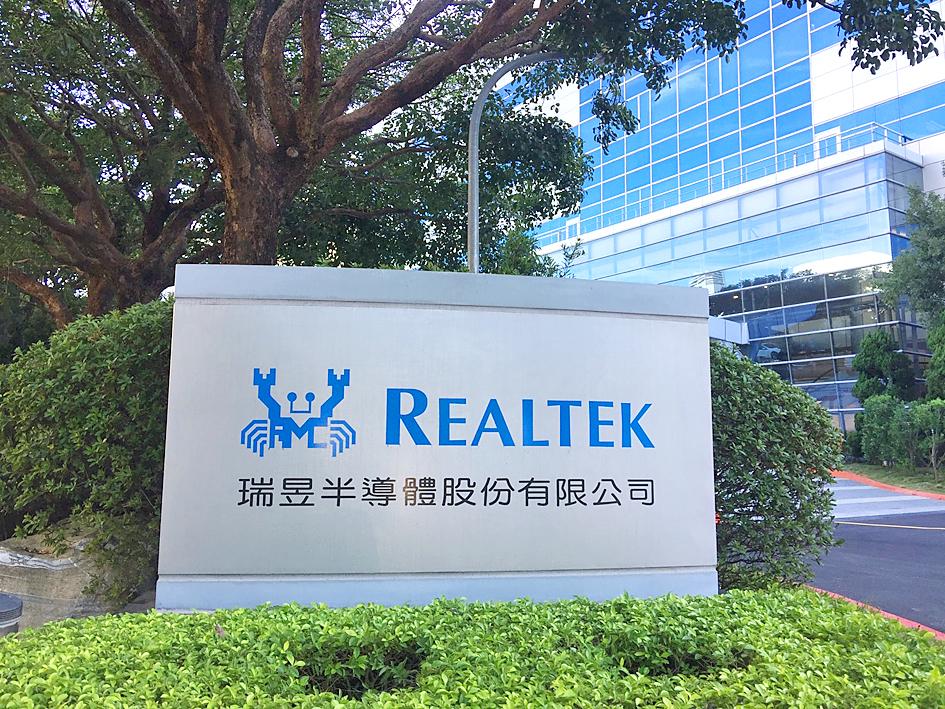Networking chip designer Realtek Semiconductor Corp (瑞昱半導體) yesterday said that there has been healthy demand for Ethernet switch and Wi-Fi chips through the first half of this year, as the work-from-home and distance-learning trends are stimulating a broad infrastructure upgrade.
Realtek said that growth momentum is extending from last year as the trends are here to stay amid the COVID-19 pandemic this year.
That is also spurring demand for Internet surveillance devices and outdoor LED displays that incorporate Realtek’s Ethernet chips, the company said.

Photo: Grace Hung, Taipei Times
“We are expecting PC growth momentum to last in the second quarter due to work-from-home and remote-learning trends,” Realtek spokesman Huang Yee-wei (黃依瑋) told investors during a teleconference. “The work-from-home trend is driving an even greater demand than PCs and home routers; it has caused an upgrade in overall infrastructure.”
The company said the semiconductor supply crunch is likely to persist for a while.
“No signs show an easing of the wafer supply-demand imbalance in the first quarter,” Huang said. “Realtek will work together with clients to solve the issue.”
The Hsinchu-based company plans to retain a slim inventory at 60 turnover days in the short term, Huang said.
Realtek said it is confident about order visibility for this year.
Some order backlogs would be digested in the third quarter, it added.
Ethernet switch chips, controller ICs, as well as new Wi-Fi 6 chips are the main growth drivers, Realtek said, adding that the Wi-Fi penetration rate is expected to rise to 30 percent of PCs and 30 percent of home routers worldwide this year, from 20 percent and 15 percent respectively last year.
Demand for the Bluetooth chips used in True Wireless Stereo (TWS) earbuds is also forecast to pick up this year, especially for products with active noise cancelation.
The prices for Bluetooth chips for TWS earbuds with active noise cancelation are two times higher than those without the feature, Huang said.
The company expects its TV chip shipments to be flat this year, as rising panel prices and DRAM chip prices are capping global TV shipments this year.
Net profit last quarter soared 59.7 percent annually to NT$2.63 billion (US$92.65 million) from NT$1.64 billion, while gross margin slid to 43 percent from 43.9 percent a year earlier, Realtek said.
Last year as a whole, net profit increased 29.5 percent to NT$8.79 billion from NT$6.79 billion, and earnings per share climbed to NT$17.24 from NT$13.36.

Sweeping policy changes under US Secretary of Health and Human Services Robert F. Kennedy Jr are having a chilling effect on vaccine makers as anti-vaccine rhetoric has turned into concrete changes in inoculation schedules and recommendations, investors and executives said. The administration of US President Donald Trump has in the past year upended vaccine recommendations, with the country last month ending its longstanding guidance that all children receive inoculations against flu, hepatitis A and other diseases. The unprecedented changes have led to diminished vaccine usage, hurt the investment case for some biotechs, and created a drag that would likely dent revenues and

Macronix International Co (旺宏), the world’s biggest NOR flash memory supplier, yesterday said it would spend NT$22 billion (US$699.1 million) on capacity expansion this year to increase its production of mid-to-low-density memory chips as the world’s major memorychip suppliers are phasing out the market. The company said its planned capital expenditures are about 11 times higher than the NT$1.8 billion it spent on new facilities and equipment last year. A majority of this year’s outlay would be allocated to step up capacity of multi-level cell (MLC) NAND flash memory chips, which are used in embedded multimedia cards (eMMC), a managed

CULPRITS: Factors that affected the slip included falling global crude oil prices, wait-and-see consumer attitudes due to US tariffs and a different Lunar New Year holiday schedule Taiwan’s retail sales ended a nine-year growth streak last year, slipping 0.2 percent from a year earlier as uncertainty over US tariff policies affected demand for durable goods, data released on Friday by the Ministry of Economic Affairs showed. Last year’s retail sales totaled NT$4.84 trillion (US$153.27 billion), down about NT$9.5 billion, or 0.2 percent, from 2024. Despite the decline, the figure was still the second-highest annual sales total on record. Ministry statistics department deputy head Chen Yu-fang (陳玉芳) said sales of cars, motorcycles and related products, which accounted for 17.4 percent of total retail rales last year, fell NT$68.1 billion, or

In the wake of strong global demand for AI applications, Taiwan’s export-oriented economy accelerated with the composite index of economic indicators flashing the first “red” light in December for one year, indicating the economy is in booming mode, the National Development Council (NDC) said yesterday. Moreover, the index of leading indicators, which gauges the potential state of the economy over the next six months, also moved higher in December amid growing optimism over the outlook, the NDC said. In December, the index of economic indicators rose one point from a month earlier to 38, at the lower end of the “red” light.